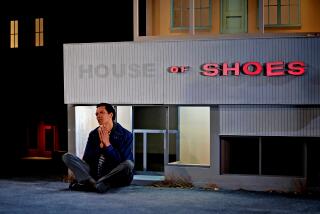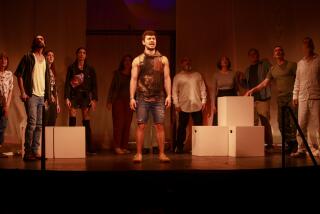‘Perfect People of Pepper Street’ Positive Smash : Inspirational Play for Young People Still Packs Tiny Theater After 4 Years
“The Perfect People of Pepper Street” will play at Burbank’s tiny Venture Theatre tonight, just as it has almost every Friday and Saturday night for 4 years. As usual, the place will be sold out.
For Gene and Toni Bull Bua, who wrote and star in “Pepper Street,” the Venture has become home. The couple spend more time on that small stage than in their nearby house. The play they wrote in 1983 will not die.
“Frankly, for me, it’s an obsession,” Toni said.
“It’s definitely a compulsion,” Gene said. “Some days I don’t feel like doing it. With all the work there is to do, it gets very draining. But then there’s the result, the audience response.
“I feel an obligation to be a part of it.”
That obligation stems from the fact that “Pepper Street” has somehow gone beyond theater. It has received commendations from Los Angeles Mayor Tom Bradley and the White House for its treatment of teen-age suicide. The play also deals with self-esteem, so the cast was chosen to perform at the closing ceremonies for the 1988 California Special Olympics. It has played to 1,500 at a Wadsworth Theatre benefit for the homeless, to a convention of psychologists and at the city’s Youth Achievement Awards ceremony.
“It’s a brilliant play for young people,” said Lydia Shane, a spokeswoman for the mayor. “It gives a very strong, very powerful message.”
“Pepper Street” tells the story of Spirit Wills, the black-sheep daughter of televangelist Sister Jane Wills. In the first scene, Spirit is convinced that she doesn’t measure up to her mother’s expectations, so she attempts suicide.
From there, the plot takes an “It’s a Wonderful Life” twist as a guardian angel gives Spirit a behind-the-scenes peek at “perfect” Sister Jane and her congregation. The mood swings from high to low and back again, with the eventual message that nobody’s perfect and everyone’s OK.
The play made its first appearance on a Hollywood church stage in 1983. In the audience that night was Richard Fulvio, who was soon to open the Venture Theatre. He asked the Buas to bring “Pepper Street” to Burbank.
Almost from the start, local hospitals and runaway centers brought groups of teen-agers to weekend shows. “Pepper Street” received dozens of letters from these youths.
“I just wanted to say thank you,” wrote a young woman named Allison. “I’ve been very depressed for a while and was about to give up. I just didn’t want to live anymore. And then I saw ‘Pepper Street’ and it changed my whole outlook on life. You helped save my life. . . .”
Last year, the musical made a brief foray into more established theater, playing for 5 weeks at the Backlot Cabaret Theatre in Hollywood. It received reviews that ranged from laudatory to lukewarm.
Times’ critic Ray Loynd praised the show’s intentions and several of its musical numbers, but wrote that “Pepper Street” dissolved into “a vaudevillian blitzkrieg. This is an ambitious but shapeless production--a heart looking for a body.”
Nevertheless, the play continues to earn high marks from community leaders, politicians and school officials.
“The energy and involvement of the cast somehow created an environment safe enough for our kids to let themselves feel and express things that they previously withheld,” wrote Pam Padin, assistant executive director of Penny Lane, a Sepulveda foundation that brought 65 sexually, physically and emotionally abused teen-agers to a recent show. “Our kids were affected so deeply that their ability to stay in touch with those feelings flowed over into their ongoing therapeutic process.”
And “Pepper Street” has become known for more than just the suicide issue. A Special Olympics official saw the play and thought that it offered something for handicapped children. She asked the cast to perform a song for the 5,000 athletes and their families at UCLA’s Drake Stadium during June’s closing ceremonies.
“It’s a very upbeat, very promising play,” said Rochelle Swanson, director of the Special Olympics’ summer games in California. “The song ‘Here’s to Life’ sets a positive idea. It applies to our athletes.”
During the past 4 years, a cadre of almost cultish devotees has gathered around the play. They say they have found an emotional truth in “Pepper Street.” On a recent Saturday night, one man in the audience had seen it eight times. A woman was making her 12th visit.
The actors seem to grow just as devoted. Kim Foley, who has appeared in the play since opening night, said she needs to do the play. Kimberlee Kramer, who plays Spirit, said she has been swept up by its emotional content.
“I’ve never been involved in anything quite like this,” said Kramer, a veteran of such television shows as “Growing Pains” and “All My Children.” “When I was growing up, there were certain things you didn’t discuss. In my family, you didn’t show anger, you didn’t feel jealous.
“For the first time in my life, I can feel all that. ‘Pepper Street’ is an amazing thing.”
The Buas wrote the play after spending 10 years as co-stars on the CBS soap opera “Love of Life.” Gene compares their creation to “Waiting for Lefty,” a 1935 drama about a taxi drivers’ union meeting that came to be a symbol for union struggles in America at that time.
“I’m not interested in doing theater unless it gets into the heart and gut of people,” he said. “Our theater gets right in your face. Bam! It forces you to deal with something.”
Recently, a “Pepper Street” fan told the Buas that she was trying to help a Jewish family emigrate from the Soviet Union. In a subsequent show at the Venture, a petition was passed throughout the audience. Those signatures were sent to President Reagan.
Three weeks ago, the family was allowed to emigrate. Toni said she doubts that the signatures gathered at “Pepper Street” had much to do with the Soviet government’s decision. But, she said, that effort was indicative of the play’s theme.
“ ‘Pepper Street’ is a social phenomenon,” she said.
“It is beyond theater,” Gene said. “It has an impact that can change things.”
More to Read
The biggest entertainment stories
Get our big stories about Hollywood, film, television, music, arts, culture and more right in your inbox as soon as they publish.
You may occasionally receive promotional content from the Los Angeles Times.











